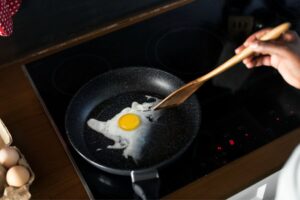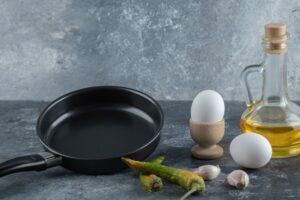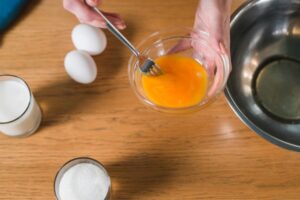Do you find eggs sticking to your non-stick pan? If so, this article provides practical solutions on how to prevent this from happening. You’ll understand why the eggs stick to surfaces they shouldn’t be. So, read on for more.

Why Do Eggs Stick to Non-Stick Pans?
Eggs will stick to non-stick pans because of the protein in them. Naturally, when the egg is heated, it coagulates to form a sticky film that adheres to the pan. This chain is made up of long chains of amino acids.
Made up of oxygen, nitrogen, hydrogen, and carbon atoms, when heated, the proteins form an interconnected film that is adhesive and sticky.
During the heating process, the white part (albumen) and the yellow part (ovalbumin) change shape allowing the proteins to bond together. This results in an adhesive proteinaceous film that prevents even the cooking of the egg.
Other factors that cause your eggs to stick to non-stick pans include the following:
- Inadequate fat: While non-stick pans are intended to prevent food from sticking on their surface, you’ll still need to apply a thin layer of fat. As mentioned, when an egg is heated, it forms a proteinaceous film that naturally sticks to the cooking surface.Fat creates a layer that prevents the egg from sticking. You can use oil or butter when cooking the eggs.
- Cold pan: Another reason is using a cold pan. When you add your eggs to such a pan, they will create bonds with the surface quickly. So, when you add oil, the egg will stick to your non-stick pan. Using cold fat can also lead to sticking since it doesn’t spread evenly when cooking.
- Cooking over high heat: Besides using a cold pan, cooking over high heat can cause the eggs to stick. Using high heat can cause the coating to break down, making it less effective at preventing sticking. Furthermore, the thermal expansion can cause micro-cracks in the coating, providing sections for the egg proteins to adhere to.Cooking many eggs over high heat can also cause them to stick.
- Type of eggs: Certain egg types are more likely to stick to pans than others. For example, high-fat and overcooked eggs.
How To Prevent Eggs from Sticking to Non-Stick Pan

So, how can you mitigate the sticky mess? Let’s find out.
- Use cooking spray: Oil creates a barrier between the pan and the egg, mitigating sticking. While you can add oil or butter the conventional way, using a cooking spray will ensure an even distribution of the oil, preventing the egg from sticking to a minimum.
- Use low heat: Using high heat will damage the non-stick coating, making it more likely for the eggs to stick. Cooking over medium to low heat will prevent the eggs from sticking and prevent the coating from getting damaged.
- Heat the pan before using it: If you add your eggs when the pan is not hot enough, they will start cooking before the fat distributes evenly. This will definitely cause the eggs to stick on areas where there’s no fat. To check whether the pan is hot enough, sprinkle a few drops of water. If the water droplets sizzle, you can add the fat.
- Avoid scratching the non-stick surface: Cooking your eggs over a damaged non-stick surface will cause them to stick. To mitigate this, avoid using metallic utensils. Instead, use wooden or silicone utensils. Also, wash your pan with a soft sponge.
How to Fix a Non-Stick Pan
If your eggs continue sticking on the non-stick pan, it is time to buy a new one or fix it. And fixing it is straightforward. All you need is to sand down the pan’s surface using fine-grit sandpaper and sand.
You can buy one that is designed for non-stick pans such as Bar Keeper’s Friend. Sprinkle the product on the scratched surface and use a damp cloth to scrub the area in a circular motion. Do this until the scratches disappear.
Once you’ve removed all the scratches, rinse the pan with tap water and dry it with a towel. You can now use it to cook your eggs without worrying that they will stick on the surface.
How to Prepare Scrambled Eggs on a Non-stick Pan

How you prepare your scrambled eggs can also cause them to stick on non-stick pans. Here’s how you can prepare your eggs properly.
- Beat the eggs in a bowl until they form a smooth and milky mixture.
- Preseason the egg mixture with salt, pepper, and other seasonings. This allows the eggs to be seasoned throughout the cooking process. Seasoning the mixture after you pour the mixture into the pan will only cause the eggs to stick to the pan.
- Let the seasoned mixture sit for up to 15 minutes. It will prevent it from becoming watery.
- Add butter or oil to the non-stick pan. Not only does it form a barrier between the eggs and the pan but also prevents toxins from the coating from being released onto the food.
- Heat the pan to mid-level temperature. Using high heat can cause the non-stick surface to form micro-cracks, creating sticky eggs. Using low heat will not heat the butter or oil adequately.
- Once the oil is heated, reduce the heat. Low heat prevents burnt and sticky eggs. Furthermore, it facilitates the formation of fluffier eggs.
- Now you can add the mixture to the warm pan and stir gently. Avoid using metallic utensils as they may scratch the pan’s surface. If possible, use wooden or silicone utensils. Alternatively, you can use plastic options.
- Cut off the heat before the eggs are cooked thoroughly. It helps the pan preserve heat while not overcooking the eggs. Besides, it prevents the surface from getting damaged.
- Continue stirring until you achieve the desired consistency.
Which Is Better, Ceramic Non-Stick Pans or Teflon Pans?
Well, ceramic non-stick pans are more affordable than Teflon options. They are also efficient at preventing food from sticking when cooking.
Besides, they release less heat, meaning your eggs will cook evenly over a short period of time. They are also easy to clean and maintain.
How Long Should You Use a Non-Stick Pan?
Most premium non-stick pans will last for two to three years. However, you should replace the pan if you notice food sticking, discoloration, rusting, and deep scratches.
Final Thoughts
Eggs sticking to a non-stick pan can be due to several factors. The most common include using inadequate oil, cooking on a cold pan, and a damaged surface.
To mitigate this, heat the pan and fat before adding the eggs. Make sure to prepare the eggs over medium to low heat.
And if your non-stick pan has many scratches, you can sand it down using sandpaper and sand. If you notice discoloration, rusting, and deep scratches, consider replacing the pan with a new one.
